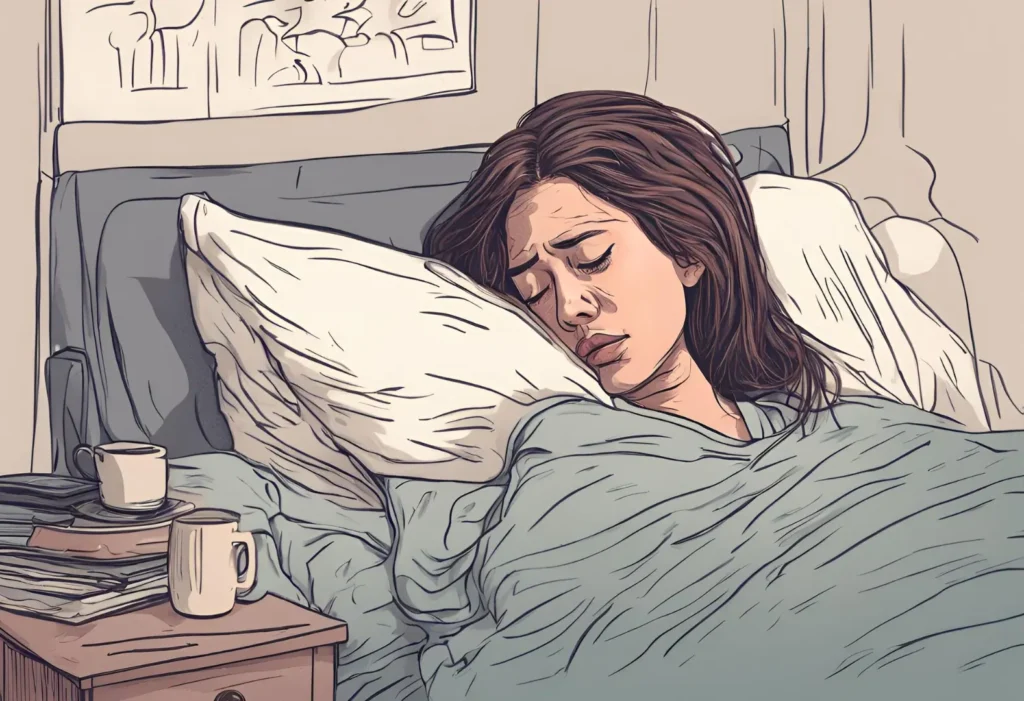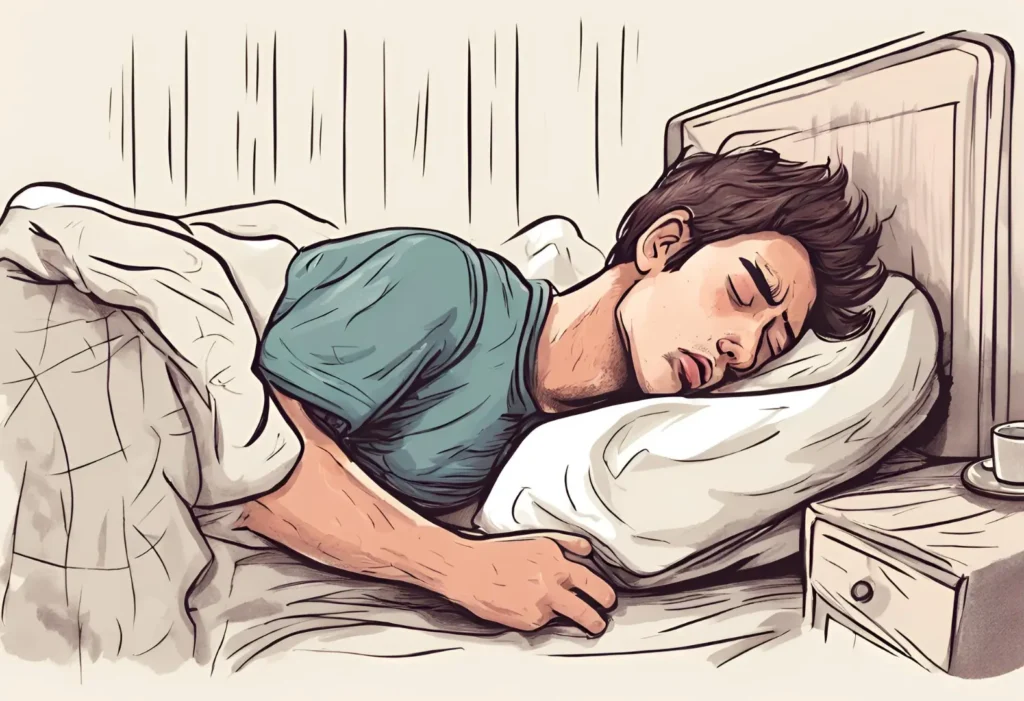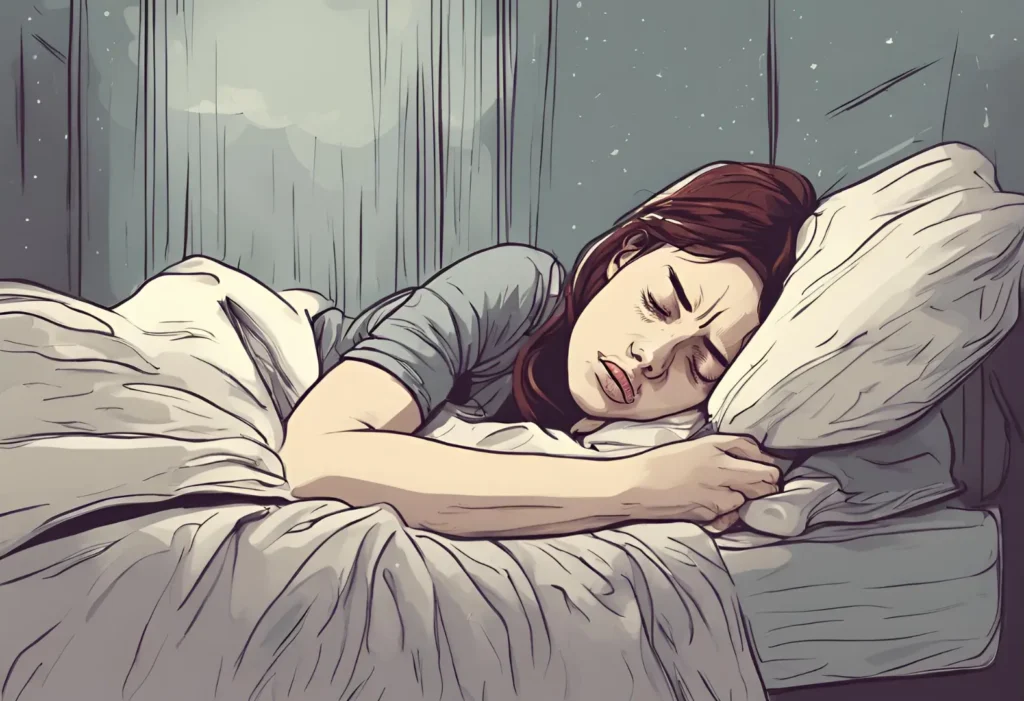As the moonlight gently bathes your room, you find yourself wide awake, lost in a maze of restless thoughts. Each night seems like a struggle, leaving you feeling drained and disconnected from the world around you. But it’s not just fatigue weighing you down; lately, you’ve noticed strange things happening when you’re awake, like hearing faint whispers or seeing fleeting shadows in the corners of your eyes.
Despite your best efforts, the lack of sleep is taking its toll on you, making it harder to focus during the day and leaving you feeling on edge. You know it’s time to seek help before these unsettling experiences take over your life.
In this article, we’ll explore the journey of individuals like you who are grappling with sleep deprivation psychosis. And we will talk about the different sleep deprivation psychosis treatments. From understanding the reasons behind it to discovering effective treatments, let’s shine a light on this challenging condition and find ways to navigate through it together.
What is Sleep Deprivation Psychosis?

Sleep deprivation psychosis is a serious condition that involves hallucinations or delusions as a result of prolonged and significant lack of sleep. It is important to note, sleep deprivation psychosis does not stem from other mental health disorders but is purely a consequence of severe sleep loss.
Hallucinations are sensory experiences that occur without an external stimulus. They can be visual, auditory, or even tactile in nature. Delusions on the other hand, are false beliefs that persist despite evidence to the contrary.
So, how does lack of sleep lead to this state of psychosis?
During normal sleep cycles, your brain goes through various stages including rapid eye movement (REM) and non-REM phases. These cycles play a vital role in cognitive functions like memory consolidation and learning. Depriving your brain of these crucial cycles disrupts these processes and can cause confusion, impaired judgement and eventually hallucinations or delusions when sleep loss is extreme.
In simpler terms, when you don’t give your brain the rest it needs through sleep, it may start to misinterpret reality leading to symptoms similar to those seen in psychotic disorders.
Remember though, while understanding this condition is important, it’s even more crucial to identify signs early on and seek professional help. The next section delves into the common symptoms associated with sleep deprivation psychosis.
What are the Sleep Deprivation Psychosis Symptoms?
When it comes to the symptoms of sleep deprivation psychosis, individuals might experience a wide range of signs. Some common manifestations include:
- Hallucinations: These are sensory experiences that seem real but are created by the mind. They can impact any of the five senses, with auditory hallucinations (hearing voices or other sounds) and visual hallucinations (seeing things that aren’t there) being the most common.
- Delusions: A person suffering from sleep deprivation psychosis may hold untrue beliefs that they refuse to give up, even in the face of conflicting evidence.
- Disorganized Thinking: This involves difficulty organizing thoughts or connecting them logically. A person might have trouble following a conversation or might speak in a way that is confusing to others.
- Emotional Disturbances: Changes in mood or emotional responses can also occur. This can involve sudden shifts in feelings, inappropriate emotional reactions, or a general lack of emotion.
Beyond these symptoms, chronic sleep loss can have significant impacts on mental health. Long-term sleep deprivation can lead to increased anxiety, depression, and irritability. It can also affect cognitive function, leading to problems with memory, concentration, and decision-making abilities.
Spotting the signs of hallucinations and delusions in individuals with sleep deprivation psychosis is crucial for early intervention. If you notice someone frequently reporting seeing or hearing things that aren’t there, holding fast to untrue beliefs or demonstrating disordered thinking patterns and emotional disturbances – it’s high time to seek professional help.
How long does Sleep Deprivation Psychosis last?
Sleep deprivation psychosis, while disconcerting, is typically a temporary condition. It’s characterized by an altered perception of reality, including hallucinations and delusions, which are direct results of prolonged sleep loss. A crucial aspect to remember is that these symptoms usually decrease or disappear entirely once the individual manages to achieve sufficient rest.
The duration of the psychosis varies from person to person. It primarily depends on how long the individual has been deprived of sleep and the severity of the sleep deprivation. Other factors influencing the length of symptoms include:
- Physical health: The healthier a person is physically, the more resilience they possess against the adverse effects of sleep deprivation.
- Mental health: Pre-existing mental health conditions can intensify sleep deprivation psychosis symptoms and prolong their duration.
- Stress levels: High stress can exacerbate symptoms and extend their persistence.
While sleep deprivation psychosis can be alarming, understanding its temporary nature is reassuring. Remember, seeking professional help is essential for accurate diagnosis and effective treatment options. The subsequent section will delve into these treatment options to provide more clarity on managing this condition.
Sleep Deprivation Psychosis Treatments

Addressing Underlying Causes and Improving Sleep Habits
Successful management of sleep deprivation psychosis often requires a multifaceted approach. One vital component is tackling the root causes and refining sleep routines to prevent the recurrence of symptoms. Here’s a closer look at these strategies:
Identifying and Addressing Underlying Causes of Insomnia
Insomnia can arise from various issues, and identifying these factors is crucial to treating sleep deprivation psychosis. Common culprits include:
- Stress and anxiety: Psychological stressors that lead to restlessness and hinder sleep
- Medical conditions: Physical ailments such as chronic pain or respiratory problems disrupting sleep
- Environmental factors: Noise, light, or temperature variations in the bedroom that impede restful sleep
- Lifestyle choices: Consumption habits like caffeine intake, nicotine, or irregular sleeping patterns
By pinpointing specific triggers for insomnia, tailored interventions can be developed to mitigate these influences.
Importance of Maintaining a Consistent Sleep Schedule
A regular sleep routine is paramount in restoring normal sleep patterns. This includes:
- Setting fixed wake-up and bedtime hours: Aligning with the body’s natural circadian rhythm promotes better quality sleep
- Limiting naps: To ensure readiness for sleep at nighttime
- Prioritizing sleep as a non-negotiable part of daily routine: Acknowledging its importance for general well-being
Improving Overall Sleep Hygiene
The practices surrounding bedtime are collectively known as sleep hygiene. Enhancing these can significantly improve sleep quality:
- Creating a bedtime ritual: Activities like reading or listening to soft music can signal the body it’s time for rest
- Optimizing the bedroom environment: Ensuring darkness, comfortable temperatures, and quiet can make the bedroom conducive to sleeping
- Avoiding stimulants before bed: Steering clear of caffeine and electronic screens helps prevent disrupted sleep cycles
Strategies for Managing Chronic Sleep Deprivation
For individuals facing ongoing challenges with getting adequate rest:
- Relaxation techniques: Methods such as meditation, deep breathing exercises, or progressive muscle relaxation aid in calming the mind
- Exercise: Regular physical activity helps to regulate sleep patterns but should be avoided close to bedtime
- Seeking professional help: Therapists or sleep specialists provide guidance on managing severe cases of chronic insomnia
By addressing contributing factors and enhancing nightly rituals, individuals can pave the way for improved mental health and recovery from sleep deprivation psychosis. The next section will delve into how therapy options like cognitive-behavioral therapy (CBT) further support those dealing with this condition.
2. Sleep Therapy and Cognitive-Behavioral Therapy (CBT)
Treatment for sleep deprivation psychosis involves addressing both the physical and psychological aspects of the condition. Two important methods used in this treatment are sleep therapy and Cognitive-Behavioral Therapy (CBT).
Sleep Therapy
Sleep therapy focuses on improving the quality of sleep and includes various techniques:
- Sleep Restriction Therapy: This method involves limiting the time spent in bed to the actual sleeping hours, which helps increase sleep efficiency.
- Stimulus Control Therapy: The goal of this approach is to associate bed and bedtime with sleep by establishing a consistent sleep schedule and using the bed only for sleeping.
Cognitive-Behavioral Therapy (CBT)
CBT plays a crucial role in managing chronic sleep deprivation. It helps individuals identify and change their patterns of thinking or behavior that contribute to insomnia.
CBT can be beneficial for people with sleep deprivation psychosis through the following techniques:
- Cognitive restructuring: This involves challenging and changing negative thoughts and beliefs about sleep.
- Relaxation training: Techniques like deep breathing, progressive muscle relaxation, or meditation can help lower stress levels and prepare the body for sleep.
- Sleep hygiene education: Learning about good sleep habits, such as creating a comfortable sleep environment and establishing a bedtime routine, can promote better sleep.
It’s important to note that CBT has been proven effective in addressing the underlying causes of insomnia, improving sleep habits, and reducing symptoms associated with the condition.
By combining both therapeutic approaches – sleep therapy and CBT, those suffering from sleep deprivation psychosis can experience significant improvements.
3. Medications and Other Medical Interventions
When sleep deprivation psychosis intensifies, medication may be necessary to alleviate severe symptoms. These medications are typically used as a short-term solution to stabilize the condition while concurrently implementing longer-term treatment strategies.
Medications for Sleep Deprivation Psychosis:
- Antipsychotics: In acute cases, antipsychotics may be prescribed to quickly reduce symptoms such as hallucinations and delusions.
- Benzodiazepines: While generally used for anxiety, they can also help individuals with sleep deprivation psychosis by promoting relaxation and sleep.
- Sleep Aids: Non-habit-forming sleep medications might be considered to help re-establish a regular sleep pattern.
Each medication option must be carefully evaluated by healthcare professionals, as they come with potential side effects and risks of dependency.
Other Medical Interventions:
Beyond medications, there are additional interventions designed to target the root causes of sleep disorders:
- Continuous Positive Airway Pressure (CPAP): For those with sleep apnea, CPAP machines can improve sleep quality and reduce the risk of psychosis due to sleep loss.
- Light Therapy: Used primarily for conditions like circadian rhythm disorders, light therapy can help reset the body’s internal clock.
- Surgery: In rare cases, surgical intervention may be necessary for treating structural issues causing obstructive sleep apnea.
It’s essential that these interventions are part of a comprehensive treatment plan that includes lifestyle adjustments and therapy when addressing underlying causes of insomnia. By combining medical treatments with changes in sleep habits, individuals have a better chance at managing chronic sleep deprivation effectively.
4. Lifestyle Changes and Complementary Therapies
When recovering from sleep deprivation psychosis, integrating healthy lifestyle changes can significantly support sleep and mental well-being. These changes often center around creating an environment conducive to restful sleep and adopting habits that promote relaxation.
Healthy Lifestyle Changes:
- Establishing a Regular Sleep Routine: Going to bed and waking up at the same time every day helps synchronize the body’s internal clock.
- Creating a Restful Environment: Keeping the bedroom dark, quiet, and cool can enhance sleep quality.
- Limiting Screen Time Before Bed: Reducing exposure to blue light from screens can prevent disruptions in melatonin production, which is crucial for sleep.
Complementary Therapies:
- Exercise: Regular physical activity has been shown to improve sleep quality. It’s advisable to complete exercise at least a few hours before bedtime to avoid overstimulation.
- Relaxation Techniques: Methods like deep breathing exercises, meditation, or yoga can reduce stress and make it easier to fall asleep.
- Herbal Supplements: Certain herbs like valerian root or chamomile may have sedative properties. However, it’s essential to consult with a healthcare provider before using any supplements.
Each of these strategies plays a role in addressing underlying causes of insomnia and managing chronic sleep deprivation. Embracing these approaches could lead to improved sleep patterns over time, thereby alleviating symptoms associated with sleep deprivation psychosis. It is important for individuals to tailor these strategies to their specific needs and preferences, enabling more effective and sustainable recovery.
Conclusion
Restoring mental health and facilitating long-term recovery from sleep deprivation psychosis requires active efforts to address sleep deprivation. The importance of this cannot be overstressed. Prioritizing sleep, establishing a consistent sleep schedule, and dedicating time for relaxation are not just beneficial – they are essential.
If you suspect you’re experiencing symptoms of sleep deprivation psychosis, it’s crucial to seek a comprehensive evaluation and personalized treatment plan from a healthcare professional. This article is a resource to increase understanding and awareness, but it doesn’t replace professional medical advice or treatment.
Emphasizing the need for healthy sleep habits becomes even more urgent when considering its role in preventing sleep deprivation psychosis. Good sleep isn’t just about feeling refreshed—it plays an integral part in maintaining overall mental well-being.
Read More: What is the point of a Sleep Diary?



